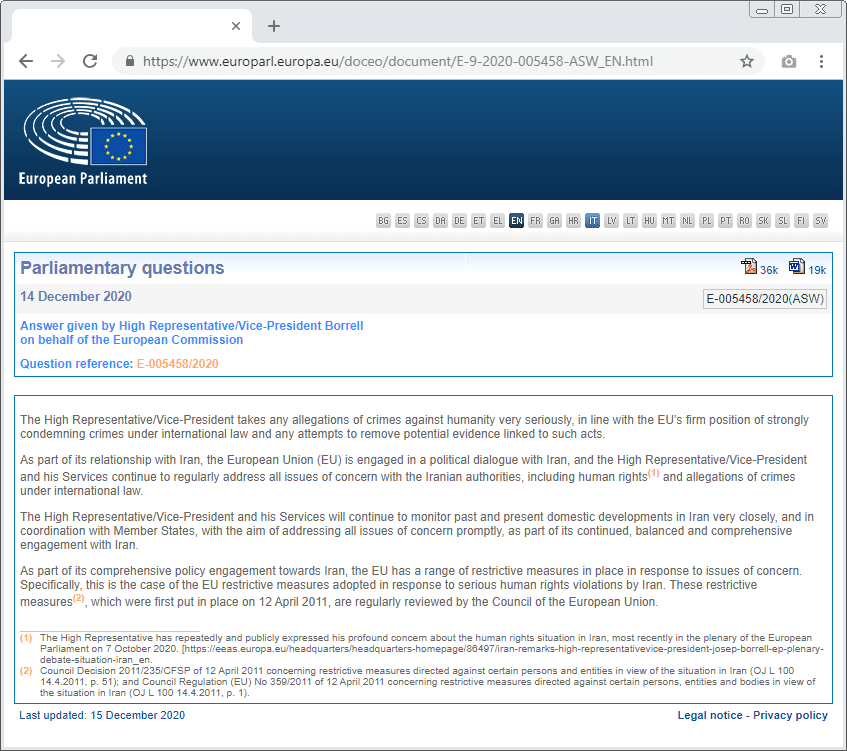The European Union’s foreign policy chief Josep Borrell has responded to a question from a Member of the European Parliament concerning the 1988 massacre of political prisoners in Iran.
On 6 October 2020, Italian lawmaker Elena Lizzi MEP submitted a question for written answer, with the subject: “Quest for the truth regarding crimes against humanity committed in 1988 in Iran.”
EU High Representative for Foreign Affairs and Security Policy Josep Borrell responded on 14 December 2020 on behalf of the European Commission.
The following are the full texts of the MEP’s question and the response by the EU High Representative:
Question for written answer
6 October 2020
E-005458/2020
Question for written answer E-005458/2020
to the Vice-President of the Commission / High Representative of the Union for Foreign Affairs and Security Policy
Rule 138
Elena Lizzi (ID)
Subject: Quest for the truth regarding crimes against humanity committed in 1988 in Iran
In the summer of 1988, the ruling ayatollah Ruhollah Khomeini ordered the massacre of over 30 thousand political prisoners. To date, nothing has been done by the international community to shed light on the tragedy and obtain justice for the thousands of students and political activists brutally killed and then buried in numerous mass graves scattered throughout the country.
The story took a further alarming twist with the subsequent assassination in Geneva of Ambassador Rajavi, who was endeavouring to shed light on these events, which to this day remain unresolved. Indeed, Ayatollah Montazeri intimated that those responsible still held important Iranian establishment posts.
To date, the circumstances surrounding the 1988 executions have not been elucidated owing to the immunity enjoyed by those responsible and the persistence of the Iranian regime in denying that they actually took place.
In view of this:
- Can the Vice-President / High Representative say what action he will take to shed light on these crimes against humanity in order to bring justice and truth to the families of the victims?
- Will he impose sanctions on Iran in line with based on the measures already taken by the United States?
- Is he aware of plans by the Iranian Government to destroy the mass graves located in the country in order to remove once and for all any evidence that the killings actually took place?
Source: https://www.europarl.europa.eu/doceo/document/E-9-2020-005458_EN.html

Answer for question E-005458/2020
14 December 2020
E-005458/2020(ASW)
Answer given by High Representative/Vice-President Borrell
on behalf of the European Commission
Question reference: E-005458/2020
The High Representative/Vice-President takes any allegations of crimes against humanity very seriously, in line with the EU’s firm position of strongly condemning crimes under international law and any attempts to remove potential evidence linked to such acts.
As part of its relationship with Iran, the European Union (EU) is engaged in a political dialogue with Iran, and the High Representative/Vice-President and his Services continue to regularly address all issues of concern with the Iranian authorities, including human rights(1) and allegations of crimes under international law.
The High Representative/Vice-President and his Services will continue to monitor past and present domestic developments in Iran very closely, and in coordination with Member States, with the aim of addressing all issues of concern promptly, as part of its continued, balanced and comprehensive engagement with Iran. As part of its comprehensive policy engagement towards Iran, the EU has a range of restrictive measures in place in response to issues of concern. Specifically, this is the case of the EU restrictive measures adopted in response to serious human rights violations by Iran. These restrictive measures(2), which were first put in place on 12 April 2011, are regularly reviewed by the Council of the European Union.
[1] The High Representative has repeatedly and publicly expressed his profound concern about the human rights situation in Iran, most recently in the plenary of the European Parliament on 7 October 2020. [https://eeas.europa.eu/headquarters/headquarters-homepage/86497/iran-remarks-high-representativevice-president-josep-borrell-ep-plenary-debate-situation-iran_en.
[2] Council Decision 2011/235/CFSP of 12 April 2011 concerning restrictive measures directed against certain persons and entities in view of the situation in Iran (OJ L 100 14.4.2011, p. 51); and Council Regulation (EU) No 359/2011 of 12 April 2011 concerning restrictive measures directed against certain persons, entities and bodies in view of the situation in Iran (OJ L 100 14.4.2011, p. 1).
Source: https://www.europarl.europa.eu/doceo/document/E-9-2020-005458-ASW_EN.html


